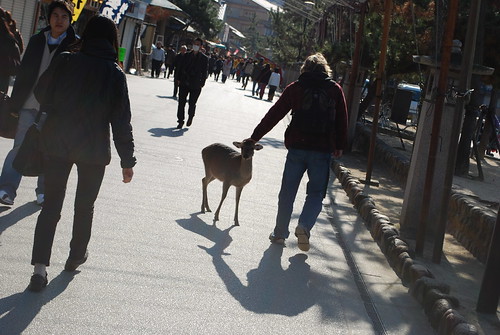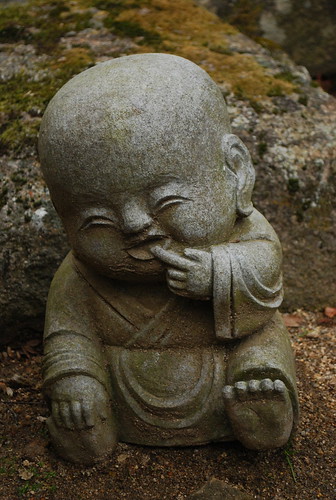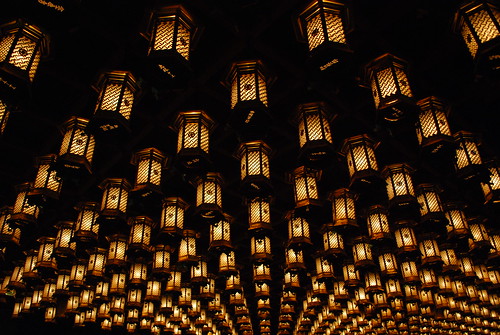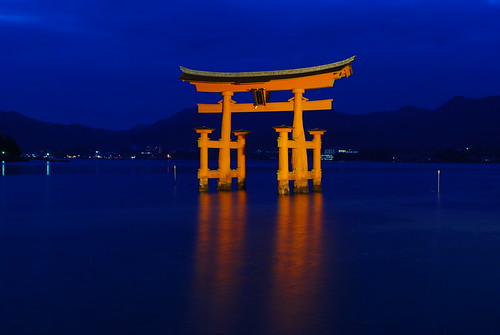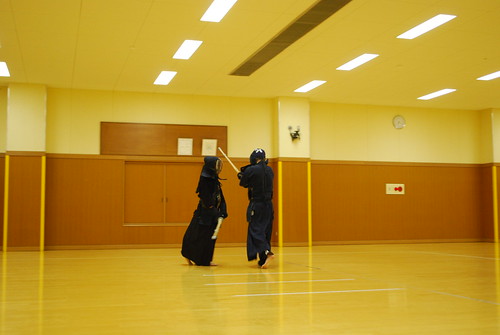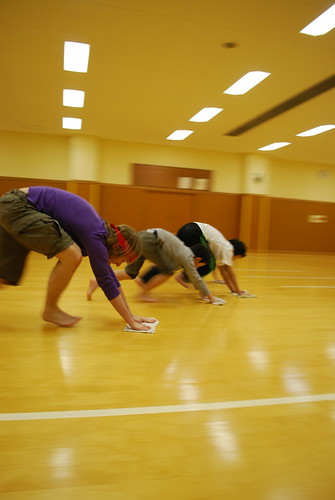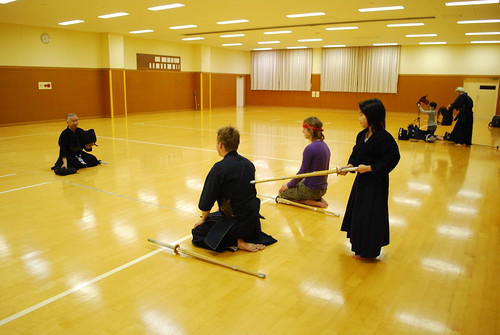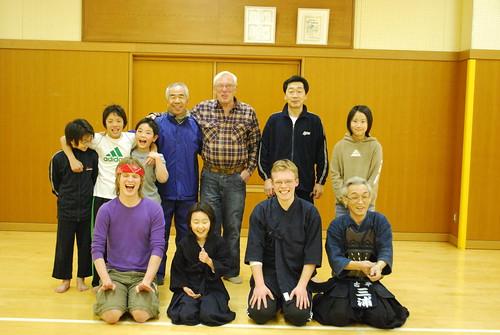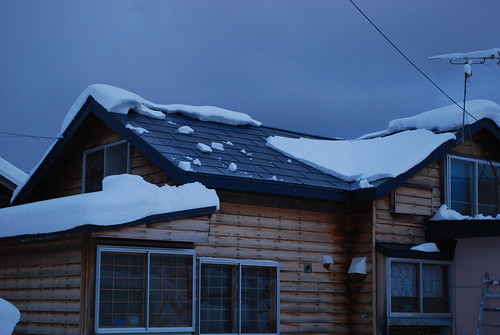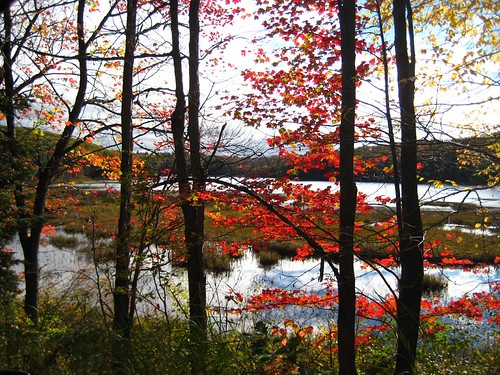Thursday, December 31, 2009
Year's Ending
You know I'll be thinking of you as i stand here, alone on a mountain top, crammed in with hundreds of my closest strangers. My brother and dad crapped out after all our temple hopping today, so its just me and the crowds and 17 monks and their 74-ton bell here in Kyoto.
But between the clouds, the moon is full, and when the clouds do come, they bring me snow: dusting down in the yellow floodlight. It's come down all the way from Hokkaido tonight, little white pieces of home to keep me company.
It's just over two hours now before year's turning here, on the other side of the world. Gong will go the bell, and gone will be the first decade of this brave new millennia.
I hope this beginning finds you well, and just maybe, if you listen closely, you'll catch the faintest echoes of the Chion-in bell in the night, chasing the change around the globe.
Wednesday, December 30, 2009
広島県 (Of Hiroshima)
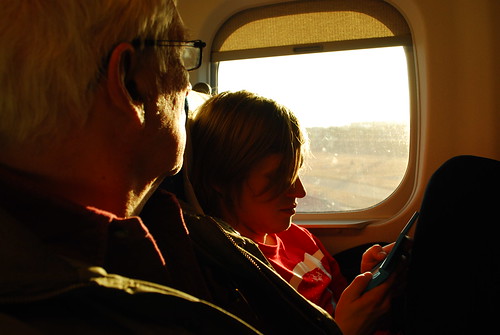 But here it is, and it warmed me. On that train, I was hit by sentimental waves of Greece and Scandinavia and Estonia and London, and in the midst of being buffeted by them I realized this adventure of ours had really begun.
But here it is, and it warmed me. On that train, I was hit by sentimental waves of Greece and Scandinavia and Estonia and London, and in the midst of being buffeted by them I realized this adventure of ours had really begun.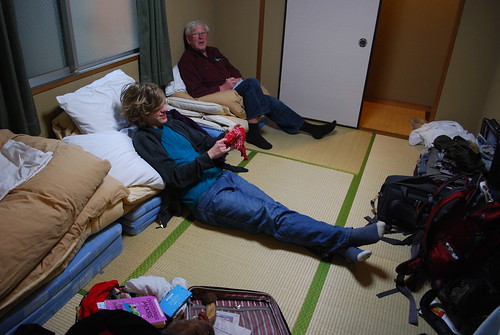 Our hostel in Hiroshima was bare bones in that livably Japanese way, with our own toilet, sink, and futons, but little else that wasn't shared. It provided dad with coffee and Craig with facilities for pursuing his ongoing mochi addiction.
Our hostel in Hiroshima was bare bones in that livably Japanese way, with our own toilet, sink, and futons, but little else that wasn't shared. It provided dad with coffee and Craig with facilities for pursuing his ongoing mochi addiction._____________
Hiroshima itself has been two worlds:
Yesterday: sunny Miyajima.

The shockwave hurtling down from a height of 580 meters to strip away the majority of the prefectural office like rags or flesh, leaving only the current skeleton of steel and rock; the firey ball of plasma boiling down in the shockwave's wake--a vivid visual of fire passing through the metal remains of the dome, like smoke through a latticework.
The birds that now roost among the ruins of the A-Bomb Dome; pidgeons still picking hopefully through the rubble; something like starlings perching on the metal work of the actual dome and flitting to and frow among the standing remains in a flock.
Thousands of people being reduced to atoms, the trauma and absolute nature of their destruction going so far as to undo the very boudaries of their spirits so that both the molecules of their DNA and the shadows of their souls begin to overlap. And in the heat and the dark, as everything that once composed them is forced upwards into the azure sky, they fuse. Thousands of souls all rising together; a vast, sentient thing that rides the winds away from the inferno. The one, eclipsing soul of Hiroshima's dead.
Enola Gay, learning of that daft son of hers' last attempt to do something to make her proud. She, rolling her eyes and shaking her head with a morbid laugh, wondering if that ol fool will ever learn.
Saturday, December 26, 2009
Modern Myths: Urban Warming
What Saff got me thinking about was whether this might be an affliction of the soul of the city as well, rather than just an environmental affliction of it's body. If the idea that a city could have a soul seems alien to you, seek out Italo Calvino's Invisible Cities. In it a phenomenally gifted Italian author of whimsy muses about the personalities of cities in the guise of conversations between Marco Polo and the Emperor Kublah Kahn. The near-personifications of the cities are so smooth and vivid that I used them as lullabies for a time. Or you could seek out the Sandman volume Worlds' End (Saff could better tell you which specific issue of the comic), wherein Neil Gaiman explores the dreams of cities and the consequences of them ever waking.
Both authors lend a personality--a soul--to cities that is greater than the sum of their streets and inhabitants. And when we talk about the fact that cities are no longer getting snow in the way they once did, I wonder if it's not an affliction of these synergetic souls. It's something about the cities' peoples being so constantly busy and in such a hurry. It whips up the air in a way, a metaphysical exothermic buildup of shit that needs to get done. The hardships and worries of all these people crammed into such a small area spill over into the cities' slumbering minds, and the anxiety burns in them like a fever. And, even though the citizens are rushing here and there all day long, they pass one another as silent ships, their only communications the binary strings of cell towers that glow red in the night from all the traffic flowing through them.
Perhaps the cities have grown and developped into a thing that is the antithesis of snow.
Snow: that natural element, meant to sanitize, slow, and insulate. Now it will only linger for any reasonable amount of time outside the cities, where the lives of people proceed at a pastoral pace slow enough to allow the snow to stay.
And if this is more than just urban warming? As the souls of the world's great cities fall sick with this fever of progress, burning across the skin of their concrete and ashphalt, they are the lymph nodes of the greater world, and through them the fevrile infection spreads to the world itself. Global warming, not as a consequence of carbon but as a spiritual affliction that we've inflicted on our world through the fervrent speed at which we've come to conduct our lives.
Could the snow be just a sympthom: an early harbinger of a more malignant sickness gone unseen?
Thursday, December 24, 2009
'Twas the night before Christmas...

Monday, December 21, 2009
Modern Myths: Cold Cellar

As the snow really piles up in Furubira, I see the ‘ba-chans dealing with it by dumping it down into the crevase-like open storm drains. The drains run along the roads on either side and are covered by concrete slabs with slots between them to allow drainage.
However, the slabs aren't so large that you wouldn’t be able to, say, drag one of them off to expose the deep, trough-like drain below. And this is exactly what the ‘ba-chans do. They prop the slabs up, like giant cement trap doors, at the edges of the square, black holes in the otherwise perfectly uniform whiteness of the hard-packed streets and sidewalks. I watched as whole snowplows full of white powder vanish down the square voids with the efficiency of those Acme-brand, moveable black holes from the Bugs Bunny cartoons.
There’s something arcane about it for me: the dumping of all that snow down those holes; out of sight, out of mind, and with no indication that it’s piling up or that there will ever be any end to those cavernous spaces under the streets.
I picture a massive cold cellar; an icy furnace beneath Hokkaido that is stoked with snow by the shovelful throughout the long winter.
And, at the height of the hot Japanese summer—when the people of Honshu, Shikoku, and Kyushu are quickly turning to puddles in the oppressive, humid heat—in Hokkaido cooling breezes blow forth from forest caves and river beds. They link up to the expansive ice caverns beneath the island, where there is still snow that has sat unmelted since the times of the Ainu—ice that is older still, from down dark paradigms of time, to back when these islands were ruled by something other than men.
Keeping up with the Joneses
Sunday, December 20, 2009
Relentlessly Beautiful
All of the angles in this place have come to curves under the unrelenting accumulation. The solemn, standing stones in the haka have come to better resemble overiced cakes.
Poles have sprouted teetering white affros, and the trees are like molecules or solar systems: their boughs turned to bulbous white planetoids.
The snow piles up, vast and deep, like glaciers or continents on the slanted metal roofs of houses. As the kerosene stoves burn, heating up the houses, these continents of powder go sliding down the inclines and fall to the ground with whomps that you feel in your chest. I closed my closet door a little too forcefully the other day, and i could hear the impact of it echo in the breaking up and sliding of the snow on the roof above, felt the muffled whomps in my chest as it all cascaded down into the yard. While walking through town, you have to be careful not to walk too close to the buildings least you should be lost, burried utterly in one of these avalanches from above.
With the dwindling amounts of dark peeking out from under all of the white, it's like the world is slowly being erased, leaving only blank, white paper behind—the negative-space wet dream of some impressionistic artist.

For someone who loves snow as much as I do, this is some kind of freak Christmas miracle. For all my years living in Canada, I don't know that I've ever had the opportunity to witness this much snow. Riding into Yoichi today on a bus out of Sapporo, I almost missed my stop because the town had become so bulbous and white as to be alien. It makes me wonder as I prepare for the arrival of Craig and my father on Wednesday if their impression of Hokkaido might not be one of an Antarctic marshmallow land of snow. I wonder if, were they to return in the summer months, would they be able to recognize anything of this place from their first, snowy impression. Of course there would be the mountains and the ocean to orient them, but, with another possible 40cm of snow forecast for tonight, I wonder if it might not finally succeed in entombing the mountains and the ocean as well, turning this place into one undulating, uniformly fluffy sheet of white.
I took advantage of a break in the snow today to get out and take some photos of Furubira in the snow. I've included some of them here, but there are a few more in a new Flickr set.
Tuesday, December 15, 2009
"Oh the weather outside's delightful..."


"...and the fire is slightly frightful!"
I’m blown away by the snow today.
It’s been snowing, off-and-on, since yesterday. I say off-and-on, but a better description might be “bipolarly.” I was out running some errands yesterday, and when I went into the Post Office ATM just a few flakes were drifting down, giving the impression that the storm had petered out for the day. But in the time it took me to extract 3-man, the snowmachine had ramped back up into an icy gale.
It would have been a damn cold night in the apartment had it not been for the translative powers of my okasan (Japanese mom) and the swift generosity of my Board of Education. Last Friday, I had elected to try to get something done about the icy conditions in my bedroom. With the help of aforementioned okasan, I asked the BOE if they might not be able to install another kerosene heater in my bedroom as all of the required gas lines and ventilation pipes were already present, and the current temperature back there was lingering icily close to zero.
Where I had expected the universal Japanese diversion/negation of teeth sucking, I instead encountered a remarkable gusto for getting the problem solved—post haste! My supervisor quite literally jumped onto the phone and started calling around about heaters. In the span of a minute, he had found one and was already apologizing to me that they couldn’t have it installed that very day as it needed to be cleaned and, thus, might not get installed until some time later this week. I assured him that was fine by me.
And then at the high school yesterday, just after my and Nishida’s first class, we get a call out to my apartment by my supervisor. By the time we get there to let him in, he’s already gotten a key from my landlord, and a team of no less than four dudes is busily fixing light fixtures in my hallway (HAL 9000 got an upgrade, apparently) and installing heaters in my bedroom.
That was fast.
So when I was finally able to turn the heater on last night, it registered the inhuman temperature of 2 degrees in the room, but it quickly got to work firing it up to something more habitable. Sure, the heater’s a bit old, and it’s got a vague air of burning about it, but it’s a comforting kind of burny smell—something like throwing your childhood blankie into a roaring fireplace on a cold winter’s night.
To celebrate the victory, as well as the three other problems she solved for me last Friday, I had my okasan over for dinner last night. She was my first dinner guest, and she routinely has me over for lavish spreads at her place, so I made sure to do it up right. She had requested something Canadian, so I made her one of the things I’m most proud of: Jonezer Chilli. I rounded it out with salad, rice, Japanese pickles (tsukemono), daikon kimchi, and some COSCO-bought-and-actually-drinkable red wine. When it was all arrayed on the table, there was a distinguished air of presentation about it, something ol daddio would have been proud of as neither he nor I are much for presentation when it comes to serving up grub.
As my okasan was leaving last night, I took a last look at the snowstorm before heading to bed, seeing that it had not let up and was settling in to a steady rhythm for the night. When I woke up this morning, I found that a good 10cm had settled in on top of the 8-or-so-cm that had fallen yesterday, and the snow wasn’t showing any signs of letting up any time soon, coming in on a near-horizontal angle at a near-whiteout clip. Needless to say, I was all smiles by the time I got to my junior high school this morning, and, seeing me grinning widely with no less than a good few centimeters of snow accumulated on my shoulders and bag, the second years who greeted me must have thought I was some special Canadian brand of crazy. With this much snow coming down this early in December, I’m thinking I definitely got placed in the right part of Japan.
And then I get into my desk in the teacher’s office and find that the big Alphonse Mucha print I’d torn off my brand new calendar...
…had spontaneously spawned itself some offspring in the form of another random Japanese act of kindness.
With the snow still coming down outside the teachers’ office’s tall, panoramic windows as I write this, it would seem as though it’s shaping up to be a great day, and the bitchy, disrespectful second years that I have in last period are going to have to be pretty crappy indeed to bring me down from this high.
Not that I don’t think they’re up to the challenge. They’ve shown themselves to be more than capable.
Saturday, December 12, 2009
"Once winter hits, you'll never be warm again"

Tanaka-San, the successful banker-cum-custodian in my dwindling town, strides through the elementary, head held high, broad shoulders practically brushing the walls of small corridors. Clouds of breath before him herald his passing, and the rubber soles of his shoes stick where they don’t slide on the icy corridor floor. He takes huge, metal scrapers to the crystallized interiors of windows in the more remote parts of the school, assuring that the ice never gains too much purchase. Using ample elbow grease, he cracks the frost in the doorjambs of classes, and inside he kick-starts each of their six suns. Though the monolithic heaters blow warmth and fill their individual worlds, with the lights above casting brilliance, the glow and the heat doesn't flow far beyond the doorways, dying out in the cold dark of the corridors beyond.
Navigating the place is an exercise in island hopping, where one must plan his pockets of warmth along the way to his destination least he should freeze up in transit. Even the thick, polar bear hide of a Canadian is not used to such extremes as we tend to have a decadent reliance on insulation—something the Japanese seem to eschew. The children, though, seem as unphased by all of it as I was at their age. They still gambol throughout this half-abandoned, frosty hulk of a building with all the effervescent joy that they had in the late days of summer. They are a plague of leprechauns unleashed in this place, and my every turn yields a little warmth in the form of a new smile or some new mischief.
With the onset of the Hokkaido winter, the seeming complete lack of insulation in my apartment has lead to me losing more and more territory in my large-ish pad. I make fewer forays out of my front room, where I have my desk, kitchen, sitting area and a real mother of a kerosene heater. I would spend most of time in the front room as the days got colder, only braving the icy hallway beyond when I needed to dress, bathe, shit, or sleep. But even then I had to rely on an electric blanket and two small electric space heaters to get my bedroom to a functional temperature. However, when the room got to the point where my breath would linger before me in icy clouds, I decided it might be best to relocate my sleeping quarters to the floor of my main/front room until the Board of Education can scrounge me up another kerosene heater for my bedroom.
So it would appear as though, for all my boasting about being Canadian and being up to the cold of a Hokkaido winter, I had really taken for granted wondrous Canadian inventions like insulation, double-pane windows, and central heating.
Sunday, December 06, 2009
An Authentic JET Moment (Stand Still)
Or inverse homesickness? Whatever it'd be called, I'm starting to feel the first vestiges of it on this Sunday, after a ridiculous four days in The Life this weekend in Sapporo. The Hokkaido ALT/JET midyear conference brought all of the foreign English teachers from Hokkaido together for a two-day conference. The sessions were pretty cool and informative, and a rather excellent keynote address/workshop from the previous prefectural advisor left me keenly aware of just how comfortable I have become here and convinced me that I can't worry quite so much about how people are getting on at home.
But the real lasting impact of the conference for me was the opportunity to see the dozens of fantastic people I'd met at Tokyo and Sapporo orientations but hadn't seen since August. With the exception of my other Toronto kids stationed at the far-flung corners of this country, I can't comment on how JETs are in the rest of Japan, but I can say that the Hokkaido JETs truly are phenomenal human beings. It seems that every time we all get back together, I meet more of them who are fantastic, and I discover that the ones who I already thought were alright are, in fact, cooler than I had previously thought. Eventually I wind up with more people I want to hang out with than there are hours in the day or seats in a restaurant. I want to be everywhere at once, and I want to be having deep, riveting conversations with each one of them concurrently.
Then I wind up on days like this: Sundays waiting in train stations for buses back to my small town, and I find myself missing these excellent people like you'd miss a lover—like you'd miss an appendage of your own body. If you know me, then you know my energy: you know my genkiness and my enthusiasm and my foolish optimism. I think that spark makes me love too quickly and too deeply, and it burns like a fire just as much for my friends as it does for my lovers. And, on Sundays like this at the dying ends of weekends spent Living The Life, that fire scorches and chars. The vivid memories of all those people and all those interactions flare up, and I feel their distance like a yawning gulf. In their absence, I'm already trying to plan more weekends with them in the back of my mind, and it already feels like there isn't enough time.
And, for an instant, I wonder if my predecessor might not have been on to something by deciding to not hang out with as many other JETs, electing instead to keep to himself. What I once thought madness seems to be some backwards solution to the separation anxiety I feel biting at the edges of my mind.
I can already see the outcome of all this—the true consequence of taking on an experience like this and truly loving it:
When I eventually return home to Canada, I will just be trading one kind of homesickness for another. It’ll be Anti Homesickness. Or maybe Inverse Homesickness. It’ll be me moving home only to start missing the away.
As I happily reunite with all and everyone that I yearn for and care about in Canada, I will begin dealing with the pangs for all I left behind in Japan. While I sit and smile with Saff and Em and their cats, or I argue happily with Amy Thede, I'll be caught by how I'm not sitting and eating and chatting with Asano Sensei, my Japanese mom, or how I'm not happily ragging on Heather and Becky for being unable to cope with the Hokkaido winter. I will get my wish and will be sitting on the deck of the SS Yanzar, or on the dock of the Campbell or Faulkner cottages, looking out at one of those keenly unique Ontario lakes, and I'll be struck by the absence of volcanic mountains and the lack of near-holy onsen water.
In the absence of Canada and all of it's people, this place has become my home, and these people have become my family and my friends. The distractions and excitement of them have been the only things to save me from homesickness while I've been here. But when I eventually return to Canada, will the familiar people and places be enough to distract me from all I have to leave behind in Japan...
Of course, just as I type this all out, I’m listening to Hey Rosetta!’s Great Canadian Songquest contribution: Old Crow Black Night Stand Still, and it’s got the sentiment perfectly:
And this will be the moment that breaks my heart
When the time creeps in and we grow apart.
Can’t we just stand still…
Can’t we just stand still…
But this isn’t all maudlin and sad. Missing these people this much is an indication of how phenomenal a weekend I just had with them, and the memories of it have got me on a high tonight. There’s a blizzard raging outside my window here in Furubira, but there’s a fire roaring in my apartment. And it’s not the pleasant glow of heat coming out of the kerosene range I’ve got; it’s burning in my mind and my body and my heart. In the hope that a part of it can just stand still, here are some photos for the Marks, and Lindsay, and Nicholas and Kevin, and Emily Covington and Johnny Walker, and Heather and Becky and Ros, and Brian and Ross and Glenn and Bry and Callie and Luce and John and Nikki and Laura and…and…and every other one of those people who I never knew four months ago and who I’ll now never be able to forget.
Wednesday, December 02, 2009
Uniformity 2.5 - Of Gaijin and the Goblin King
And that’s the way of it. The most mental, certifiably straightjacketable north american public offenses can be gotten away with, scot-free, in Japan under the broad banner of Gaijin Eccentricity. I mean, with the absolute lack of street crime here in J-land, you’re not going to get away with anything malicious (in fact, the cops are twice as likely to nab you for it because you’re a foreigner), but as long as you stay on this side of the evil gaijin line and stick to eccentricities, people are just going to point and laugh.
So I’ve made it my unofficial goal to take advantage of this exemption from social decorum when the opportunity presents itself. I try my damndest to represent for polite gaijin in important settings like the onsen and at meals, wherein wavering from the rules brands you as more of an ass than an eccentric. However, in less formal situations, where a little bit of eccentricity isn’t going to irreparably harm foreigners in the eyes of the Japanese, I can get a little crazy.
The realization that you’re going to be conspicuous no matter what you do is freeing in a way, and it leaves me feeling freer to pull off stunts I might not have the courage to attempt in Canada. It inspired me to show up in two different costumes, days before Hallowe’en, at my junior and senior high schools. And tonight at a HAJET-hosted, 80’s-themed winter ball, I intend to get a little crazy while simultaneously fulfilling one of my greatest dreams:
To dress up like Jared: The Goblin King (or, more accurately, David Bowie FromTheNineteenEightySixMovieLabyrinth), obscenely large package and all.
Such a feat would take a lot of gusto to pull off in Canada, where you’d be judged on sight for looking like such a fruit in public. I mean, you could do it in Canada, you’d just need back up the outfit with balls the size of…well, I guess the size of Bowie’s in that ridiculous costume.
However, in Japan we’re all already judged on sight, and the Japanese have—pretty much—already passed judgment on all of us Gaijin being absolute lunatics, so, really, there’s nothing to lose :)
So bring on the Dance Magic Dance!
And if you are one of the poor, unfortunate souls who has not yet seen the Jim Henson/George Lucas/Frank Oz wonder that is the Labyrinth, go check it out. It moves the imaginations of children, and it is a good way to accompany booze for adults. Plus, where else are you going to see David Bowie trying to seduce a near-pubescent Jennifer Connelly in the role she'd just as soon forget :P
Monday, November 30, 2009
Gaijin Desu Ne
(or, I suppose, Uniformity Part 2)
The exotic appeal of foreigners in Japan is at such a level as to be ridiculous by western standards. Over here my hair isn’t “blonde,” it’s “Golden.” I’ve had students ask me if I died my eyebrows to make them blonde. I’ve had a gaggle of school girls squeel “kakui!” at me when I took off my sunglasses and they saw my blue eyes. I’ve even had a woman marvel at my blonde arm hair and tell me that she wanted to shave my arm just so she could have the hair. All of these physical traits that are so quotidian in western society are aberrant here—are exotic here. At your first brushes with the reactions they elicit, you have to try hard to keep the reactions from swelling your head and making you feel like some kind of golden demi-god.
The reality is that these reactions are indicators of just how racially homogeneous—how uniform—Japanese society truly is. I’ve noticed this most when the on-the-street style reporters on Japanese news programs would ask average people for their opinions.
Every last one of the people interviewed was Japanese.
Back in Canada, you’d see a news spot like this, and the reporter would be getting opinions from all kinds of folks: from white folks, and black folks, and Middle Eastern folks, and asian folks. In Japan, all you’ve got is Japanese folks.
And that’s not just on the news. Wherever you go in this country, all you see is Japanese people. Racial diversity and multiculturalism are such alien ideas over here that when I try to talk about them, all I get in terms of a reaction are blank stares. Even when conversing with the few Japanese people I know who are, essentially, fluent in English, I get the furrowed-brow-head-tilt when I bring up the word “multiculturalism.”
It could be that I am keenly sensitive to this because I come from Toronto, and I am told that it is one of the most culturally diverse places on the north american continent (if not one of the most multicultural places on the planet). I was born and raised in Toronto, so maybe, to some degree, the normality of diversity was bred into me and I walk around with rainbow-coloured glasses on.
Regardless of whether I’m over sensitive when it comes to multiculturalism, it is a fact that Japanese society is pretty damn culturally homogenous. And it is from these seeds of cultural homogeneity that the apparent worship of the alien and the exotic grows. But It’s best not to let that veneration go to your head as the Japanese venerate the differences of the foreigner just as much as we north americans might venerate the differences of a lion when we have it behind plexiglass and steel mesh in a zoo. The exotic in Japan—that which deviates from the centuries-reinforced uniform—is a curiosity. It will always be held at arms length, no matter how interested the Japanese may seem in it. They will ask you all manner of questions to learn more about your exoticism, but the answers won’t endear you to them or provide some measure of understanding; they will only serve as further hallmarks of your oddness, and your answers will only satisfy a certain zoological interest in the asker.
Take, for example, the following interaction I had with some students:
“Pubic hair. Gold?”
“Sorry?”
Pointing to my head “Hair. Gold. Pubic hair: gold?”
Tracing a circle around his body with his index finger, making sure to include the nether regions, “Hair. All gold?”
And all I could do was shake my head. I thought about, jokingly, teaching them “do the drapes match the carpet?” but thought better of it, recalling how hideously wrong things went when my students tried to ask me about masturbation, and I tried to diffuse the situation by teaching them the English expression “what’s shaking?”
This was a specific instance, but it’s been repeated in slightly different iterations throughout my time here. Sure, these are kids, and they’re bound to be a little more gutter-minded and inquisitive than your average adult Japanese, but their questions are still evidence of the zoological impulse that seems to be suffused throughout Japanese society. It’s the thing that makes students squeal at blue eyes, and it’s the thing that makes women want to make dolls out of blonde hair.
It is the way the Japanese deal with departures from uniformity: the novelty intrigues them enough to investigate, but the difference creeps them out enough to keep the exotic at a distance.
And, least that seem like some kind of indictment of the Japanese as racists, I should make it clear that that is not my intent. What I took from all these brushes with the homogeneity—the uniformity of Japanese society is a glimpse of just how monocultural the society is. Part of our mandate here as JET/ALTs is to promote the cultures of our own countries in an attempt to “internationalize” the people in our towns.
As ALTs, we become the token, and—in a way—the proprietary foreigners for our towns/schools. The Boards of Education bring us over to teach their students English, but they also hope that we can teach the students a bit more about the world outside of Japan. And, witnessing the uniformity of Japanese society first hand, I can understand how very much in need of a little internationalization the people are. I hope that programs like JET are working on the whole and slowly wearing down the wariness that the Japanese seem to feel around foreigners/English-speakers. It’s clear that this society, founded on centuries of isolationism, has to want and accept the internationalization it seeks.
Without that broad acceptance and motivation to open its doors to the outside it won’t matter how many young foreigners you throw at Japan, it will remain a cultural island off the coast of the globalizing, multicultural Pangaea of the world.
Tuesday, November 24, 2009
Where They Left it Wild
So I was listening to the live stream this morning (your yesterday afternoon), through the wonders of the internet, and I liked Hawksley’s tune so much that I went ahead and downloaded it from iTunes. It starts out as a haunting number, with a vaguely aboriginal beat, and it climaxes in an odd cheery bit with the vivid image of
the moose and the deer come to the side of the road
to eat the salt from the winter
get away from the blackflies
that will kill you come June
before receding to a single, unrepeated statement:
and you realize quickly that its easy just to die
when you don’t got much inside of you that’s wild…
It’s where they left it wild.

The experience has left me in a fugue state, my mind wandering and evaluating its identities: me the half-assed pagan environmental crusader, as I expressed in my Sacrifice of Nines bit about the Golden Spruce. Me the City Boy realizing that the City also needs the Wild, as Sarfaraz expressed well in his bit last week about the Bruce Peninsula and Canadian conservation. Me as a boy positively dreading trips up to my father’s cottage off Georgian Bay, where there was no TV and no toilet and no sandy beach and if the mosquitoes didn’t carry you away then the rattlers surely would. Me with my lingering guilt about never loving that cottage as much as Dad and Craig and Alton and Curt and Jill and Eric and Evan and Stephanie did.
It would seem that I’m finally coming around, though. Over the last little while, something in me changed, and I went from loving the city and wanting to spend my holidays in it to loving the city but needing to escape it whenever the opportunity presented itself. Maybe it was Amy and all her outdoor hickery, or maybe it was Lindsay and her house in the woods. Maybe it was a realization come of cottaging with my friends: that you didn’t need comforts as long as you had company and beer and a nice long-drop. Or maybe it was a part of my genes, a legacy from my father the woodsman that had lain latent all these years as I lived in the City, slowly waking and driving me further and further into the woods until my strongest escape fantasies while working a 9-to-5 job took the form of jumping in my car and blazing up the 400 and the 11 and 60—not stopping until I hit the West Gate of Algonquin.
And here, in Japan—with all of its other-worldly wonder of natural hotspings and mountainous volcanoes and aquamarine-blue seas—some of my keenest bits of homesickness come from memories of the lakes of Ontario. Me, the city boy, on some big Japanese adventure, pinning for the very woods that I couldn’t get far enough away from as a child. In my spare time, I find myself idly daydreaming about tours to Haida Gwaii or cross-Canada roadtrips with my brother, wherein Lake of the Woods is as much a destination as Vancouver is.
I’ve still got a long way to go before I wind up a woodsy hermit, squatting in one of the few remaining cottages in Algonquin. But the possibility seems to be more appealing with each passing day, and it’s little ditties like Hawksley’s that remind me of the fact that—like Saff touched on—I need the wild (and maybe the greater We of Canadians need it too).
And I “realize quickly that its easy just to die when you don’t got much inside of you that’s wild…”
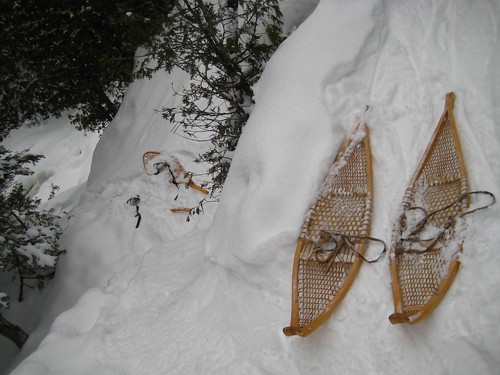
Here are the lyrics to the Hawksley tune, if you’re interested. The Ragged reference made me, of course, think of Amy Thede as I wouldn’t know what Ragged Falls was were it not for her. If Simon Ze German is reading this, he should note that Ragged was the frozen waterfall we stood on in our snowshoes, in the dead of February, in snowy Algonquin.
Where They Left it Wild by Hawksley Workman
And on the highway 60 in the middle of the night
on the sides of the roads are the following eyes
and you listen for the calls of the owl and the wolves
and you hang back silent as they fall against the moon
(and you tell yourself)
It’s where they left it wild
It’s where they left it wild
It’s where they left it wild
and then I called to the moose and I called to the deer
and we married in a swamp as the night became clear
and Centennial Ridges tell a story by the lake
and the loon cries hard to the lover that escaped
(and you tell yourself)
It’s where they left it wild
It’s where they left it wild
It’s where they left it wild
and Ragged Falls pour as we tumble in our sleep
and we dream of the beavers who are clogging up the creek
and Tea Lake ripples to the softness from the shore
and you kneel at its beauty and you worship it alone
(and you tell yourself)
It’s where they left it wild
It’s where they left it wild
It’s where they left it wild
And the moose and the deer come to the side of the road
to eat the salt from the winter
get away from the blackflies
that will kill you come June
that will kill you come June
they will change you to a skeleton in the bold wind of June
And the moose and the deer come to the side of the road
to eat the salt from the winter
get away from the blackflies
that will kill you come June
that will kill you come June
they will change you to a skeleton in the bold wind of June
they will kill you come June
they will kill you come June
they will change you to a skeleton in the bold wind of June
and there’s no service here for your mobile phone
and we feel so close here, so far away from home…home…
and you realize quickly that its easy just to die
when you don’t got much inside of you that’s wild…wild…
Friday, November 20, 2009
ITADAKIMASU!

In Japanese elementary and junior high schools, students receive a free prepared lunch every day, delivered to their classroom and served up by their peers. The teachers at the schools benefit from the same system, though they have to pay for their lunches. Regardless, not having to worry about packing a lunch is a fantastic experience. And, what’s more, the stuff that they serve up at the schools is often above par when compared to the cafeterias of Canadian schools. I mean, it could well be the Japanese equivalent of cafeteria crap in the eyes of native Japanese. However, if that’s the case, we thankfully set our bar far lower in Canada when it comes to deciding what’s fit to serve our young, growing, academic minds.
The culinary abominations of my own high school cafeteria have left me feeling like Japanese school lunches are meals fit for a king. They all tend to be at least “alright,” and at times they even nudge into “good” territory. The fact that I don’t have to make them myself and don’t have to pay for them up front also does wonders for the flavour. And, at the elementary school, the school lunch is further improved by the fact that I get to eat it in one of the classrooms with the actual students.
And when you sit and eat with the students, you can really catch glimpses of their growth. The younger grades at the elementary hardly ever clamour for seconds, electing instead to feed them to big fat gaijin sensei (that would be me). Up around grade 4, the students start developing an appetite, and by grade 6 they are screaming for the left over scraps and fighting furious janken1 wars for half a tempura shrimp. By the time the kids reach junior high, their bottomless teenage stomachs have them banging down the door of the teacher’s room on days when lunch is particularly good, looking for any scraps we happen to leave behind.
There's also the whole ceremony around lunch here. When you're eating in the classrooms with the kids, one of them will be assigned to the role of class leader for the day. This person usually prompts the rest of the class for greetings (every Japanese school period starts with students greeting their teacher, and every Japanese school period ends with students saying goodbye to their teacher), and I'm pretty sure this leader can be taken to task when the rest of the class is acting up.
When it comes to lunch, this leader is responsible for beginning and ending the meal. It begins with a raucous "ITADAKIMASU!", which is thunderously echoed by the rest of the students. It roughly translates to "thank you for this meal," but it is far more symbolic than that, referencing buddhist worship and the idea that an animal dying to feed you is one of the greatest sacrifices it could make. When you hear it every day, it starts to lose its meaning and becomes a bit of a joke as students bellow it at the top of their lungs, but as soon as you make the mistake of starting to eat before it has been said, you quickly realize how important this ceremonial element is (and that realization makes you feel like a big, stupid gaijin pretty quickly!). And, once the final student is done eating, the same class leader will clap their hands and yell "gochisosamadeshita!", which loosely translates to "it was a real feast!" and serves as the formal ending to the meal.
Just like with ever other pedestrian event in Japanese society, you've always gotta have an opening and closing ceremony.
In addition to sometimes being rather tasty, the lunches provide a degree of entertainment. Take today, for example, when I was served with a riddle, battered in a crunchy mystery coating, seasoned with some tasty enigma sauce. We got a 8-10” hotdog bun, a plate full of fried noodles, some of the awesome-fire-engine-red pickled ginger, and the meagerest scrap of Japanese bacon-cut pork you’ve ever seen. That last one, as we painfully discovered one hungover Sunday morning, is a clever ninja ploy that looks just like western bacon but tastes like a really skinny piece of pork. Yeah, it doesn’t sound so bad until you put it in your mouth expecting bacon, and you find out that it’s not.
That was my lunch, and just as I was about to set into it with the provided fork, I noticed the teacher across from me cramming the piece of faux bacon, ginger, and noodles into the big hotdog bun. I suspected this might be some clever ploy to make me look like the foolish gaijin barbarian everyone suspected me of being, but I looked around and saw everyone else was doing it. Apparently the carb-tastic meal was called yaki soba pan, which directly translates to “fried noodle bun” (duh). Why you’d eat fried noodles in a bun is beyond me, but that was the way of it.
1Janken is the Japanese version of rock-paper-scissors. But, when compared to the intensity and form of janken, rock-paper-scissors resembles a series of aimless, spasmodic flailings.
Sunday, November 15, 2009
Logofusion
Phrased like that, it sounds airy and fairy and very much like something a scholar would say. But that ain't me. I love language as a user and not as an academic. I get high on the communication. I see the words as valuable tools that slot into an overarching problem solving mechanism.
I love language when it allows for exchanges like the ones I had this weekend at the international festival that was hosted in Lindsay's town of Ishikari (just outside Sapporo).
Though Lindsay and Mark landed in the Canadian booth, my proposal for an Estonian booth was turned down as too eccentric, and I was assigned to the France booth. Apparently my fetal visit to the country and my French fluency qualified me. And according to Akemi, the festival organizer, my blonde hair and blue eyes make me the spitting image of a frenchman. So I threw on the closest thing I had to a beret and tried to class up my attire in a suitably Parisian way. To complete the package, I busted out my terrible French accent (terrible as it is accurate in a TERRIBLY creepy kind of way) and rolled my R's to Lyon and back for the perplexed Japonais. That had to be the best part as a potent, guttural, rolled R is pretty much the most linguistically foreign thing to the Japanese (with their R's coming out as a kind of limp fusion of an L and an R).
When I wasn't verbally terrorizing the Japanese, I delighted in conversing with some visiting scientists and researchers from a number of African nations. Their group had been invited to the festival through the same zoological impulse that inspires the Japanese to parade us whities around on stages and call it internationalization. But, when you start dealing in Gaijin (foreigner) currency, I'm pretty sure that the Japanese assign a little more exotic value to blacks than to whites (racist but true). Having a whole gaggle of African professionals show up, most of them sporting their traditional garb, must have felt like winning the internationalization lottery to the festival organizers.
For me, they were just an excellent opportunity to get back to using some of my French, which had started to wither somewhat over here in J-land. Though I was fortunate to have started studying a second language in kindergarten, when my mind was still young, supple, and a sponge for language (thanks mom and dad), I sometimes feel that I've only got so much storage space in my language-enabled mind. When I got over here and started using Japanese 24/7, my Estonian was the first to atrophy. I would boast about knowing Estonian to my students, only to have them ask me to speak some for them. I'd reach into the language-y parts of my mind, I'd try to switch tracks (the change from one language to another feeling almost that physical), and when I again opened my mouth I would utter linguistic abominations like "ma raagin nihongo keel."
Japanese had started to colonize the Estonian centres in my brain. When I tried to recover from these slips, I got a real sense of logofusion about it—feeling lost in the spaghetti of languages and words in my head. To get anything out in Estonian, I'd have to prefab the sentences in my head and deliver them carefully, assuring I didn't stray from my intended grammatical geography.
I worried that, given enough time, my French would start slipping away in a similar fashion: a casualty of my increasing Japanimation.
But, as I opened my mouth and spoke to these Africans, I just fell into the French. It was natural like swimming—instinctive like breathing. And, before I knew it, I was using words I'd thought I'd forgotten and phrasing sentences I didn't remember knowing. The change didn't seem laboured or physical at all as the kernel in my mind that allows me to dream in French just took charge. I fell so deep into the rhythm of it that when a particular man from Senegal couldn't speak English to the Japanese woman beside me, I had to consciously remind myself that I was speaking French, and I had to make a near-physical switch back to English.
Now, I don't know what that is, but there's a kind of power in it. Call it bilingualism or fluency, but the non-theoretical reality of it is understanding and communication. Such a cardinal thing was so powerful when fully realized at Babel that God would rather sunder the tower than allow man to achieve the further evolution beyond the barrier of language.
Ok, so maybe that's just me chasing down the myths that move me, but the tangible in it is the power of language. When you make a child bilingual, or trilingual, or quadrilingual, you only make it better. You give it a greater opportunity to problem solve and translate. You broaden its horizons and open up new worlds to it. When you give a child language, you change it's brain, and you make it powerful. I believe that because I have lived it. I will never be able to thank my mother and father enough for it.
And, should you ever be blessed with children, you should empower them with language, too. If you're in Canada, make it a priority to put them in French immersion. It doesn't matter if they have to take an hour-long bus to get to it. It doesn't matter if you can't French your way out of a paper bag (for all their touching effort, my parents couldn't!). It doesn't matter if they hate it and you have to force them to complete it. I guarantee you that, one day, they will thank you for it; thank you for the doors it opened for them—even if those doors are only in their minds.
Friday, November 13, 2009
Hope from the Future
If you worry about the coming Friday the 13th, take heart. For, you see, I have already lived it, and I bring tidings of the future!
The day will be clear, sunny, and cold. You will delight in the company of children. No matter how you worry and fuss over the lessons you are to teach them, they will love you unconditionally. You will sup with second graders, and your heart will swell as they react explosively to the bizarre ways in which you can contort your face.
You will flow through the day like quicksilver, and the day will take you down unexplored paths. To the oubliette at the head of a staircase you’d never fully climbed, where its dusty windows will paint a perfect portrait of forest. Through the seemingly pointless door behind the stage and into halls of memory.
Into that long-lost kindergarten that you thought permanently bricked up. You’ll climb through piles of surplus and cast-offs, shoaled up where the waning currents of the still-active school dropped them: Rusted and dusted tricycles. A decade’s worth of stage props. Old bathrooms with pastel rainbow rows of tiny urinals, their drains fallen to the homes of spiders. And out past them, you’ll discover classrooms empty save for installation-art-like collections of dried driftwood on blue tarps, so bone-like that you have to look twice. And out past these almost empty rooms, you’ll move into those that truly yawn like voids, where not a crayon remains of the long-passed kindergarteners.
You’ll wander further still down these halls, seemingly back through time, until the stuff starts to shoal up again from the other direction, the detritus of the distant past. Artifacts heaped like museum stacks in a distant wing of the school. Huge rusting anchors, leering ceramic masks, and wood so old it’s gone to a cracked and dusty grey. And, at the end of this ancient wing, in a building that—from the outside—seemed only half this size, you’ll find yet another door. You won’t open it, though, electing to head back rather than chancing a fall further down this rabbit hole in time.
On your return, as you pass through that first door behind the stage—out of memory and back into the waking world, you’ll be picked up by students with the simplest of “nikorasu: come”s. You won’t know where they’re going, but you’ll know it’s somewhere you want to be as they’ll be carrying graduated cylinders straight out of science fiction. In their class, they’ll present you dried stalks of rice, and they’ll show you how to strip the grains from the grass and into your waiting hand. It will seem a profoundly ritualistic practice. It will be the kind of thing you don’t want to rush least you should spoil the beauty of it. Stalk after stalk, the roughness of the grains will build a callus on your index finger, and as you cup the kernels in your palm, their fine, hard filaments will prick like thorns.
Your pile of harvested grains will grow before you on the newsprint, silver-brown, and you’ll think of that art exhibit where the world’s population was represented in grains of rice. From the vantage point of this painstaking labour, where every grain is birthed from its stalk by your fingers, that metaphor won’t seem so far fetched. And when you take that small pile into your cupped hands and pour it away into the graduated cylinder—a beggar going backwards—they’ll slide like liquid and tinkle like rain on the clear plastic walls.
This will be your Friday, just as surely as it was already mine. But it’s getting closer to Saturday here now, so I’ll get back to working while you sleep, and I’ll continue sending you the sun.


